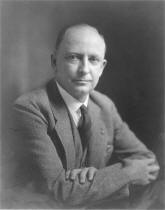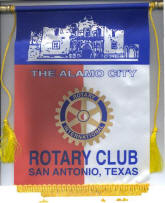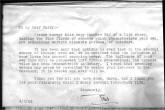|
 Harry
Rogers was born on a farm near Wheatland, Missouri, U.S.A., on May
24, 1877, and educated at Weaubleau Christian College. A precocious
student, he began teaching school himself at age 15 and taught until he
was 25, meanwhile studying at home to earn a law degree. Upon receiving
the degree, he moved to the Oklahoma Territory and, in 1903, began a
practice in the small town of Wewoka. Harry
Rogers was born on a farm near Wheatland, Missouri, U.S.A., on May
24, 1877, and educated at Weaubleau Christian College. A precocious
student, he began teaching school himself at age 15 and taught until he
was 25, meanwhile studying at home to earn a law degree. Upon receiving
the degree, he moved to the Oklahoma Territory and, in 1903, began a
practice in the small town of Wewoka.
He later
moved his practice to the city of Tulsa, and became a member of the
Rotary club there. He was active in civic life, serving as president of
the Tulsa Chamber of Commerce, and then going on to head the State
Chamber and the Oklahoma Bar Association. In 1920, he and his wife moved
to San Antonio where he built the Uvalde and Northern Railway, helped to
build the San Antonio Cotton Mills, retaining his membership in his law
firm in Tulsa and keeping active in his oil production business there.
Harry was a director of several banks in Oklahoma and Texas and served
as President of the Exchange National Bank.
He was a
director of several banks in Oklahoma and Texas and president of two of
them. With two associates he founded the Uvalde and Northern Railway and
assisted in building a cotton mill in San Antonio.
He became
involved in community service activities Tulsa, and after the move,
continued with community service in San Antonio. He was at various times
President of the Tulsa and San Antonio Chambers of Commerce, the
Oklahoma Chamber of Commerce, the Oklahoma Bar Association and the San
Antonio Independent School District Board.
A member
of the Christian Church, sharing his faith as Bible study leader and
elder, Harry also served as president of the International Convention of
the Disciples of Christ, a Protestant denomination. He headed the boards
of the Mexican Christian Institute and the Community Welfare Council,
and served on the boards of Phillips University in Oklahoma, the
University of Oklahoma, the University of Texas, Texas Christian
University, and Peabody College in Tennessee. He assisted the Osage
Indians in attaining titles to land, much of it in oil-producing
territory, thereby helping to make the tribe one of the wealthiest in
the nation.
 He
was just as active as a Rotarian. As soon as he moved to San Antonio
from Tulsa, in 1920, Harry joined the Downtown Rotary Club (now the
Rotary Club of San Antonio). Only two years later,
in 1922, he became its President. That
was the year when a lot of things happened at the International Convention. RIís
Constitution and Bylaws were revised to require all clubs organized
after 1922 to adopt the new Standard Club Constitution, and the name of
the parent organization was changed to Rotary International. It was also
a year for district reorganization, and most of
Texas
became District 13. He
was just as active as a Rotarian. As soon as he moved to San Antonio
from Tulsa, in 1920, Harry joined the Downtown Rotary Club (now the
Rotary Club of San Antonio). Only two years later,
in 1922, he became its President. That
was the year when a lot of things happened at the International Convention. RIís
Constitution and Bylaws were revised to require all clubs organized
after 1922 to adopt the new Standard Club Constitution, and the name of
the parent organization was changed to Rotary International. It was also
a year for district reorganization, and most of
Texas
became District 13.
Harry
Rogers became the 1924-25 Governor for the 13th District at the Toronto
convention on Friday June 20, 1924. The territory consisted of nearly
the entire state of Texas except for an area south of the eastern
boundary of New Mexico. By June of 1924, District 13 had more than 90
Clubs. During his year as Governor, Rogers traveled more than 18,000
miles around the district. |
It was
just the very next year that Harry Rogers became a Director of Rotary
International, the Rotary Year 1925-26. At the convention in Cleveland,
Ohio, USA, from June 15-19, 1925, he was nominated for Director from the
US by Paul Rieger of the Rotary Club of San Francisco, California, and
the nomination was seconded by Roy Yoke of the Rotary Club of
Morgantown, West Virginia on Wednesday morning June 17th, 1925. He
received 1,355 votes and was declared a Director on Friday morning, June
19th, 1925.
He was
elected President of RI for 1926-27 at the convention of
1926, in Denver,
Colorado, USA. Nominated for President by Jack Orr, of the
Rotary Club of Miami, Florida, the nomination was seconded by Fred Birks,
of the Rotary Club of Sidney, Australia and George Rooke, of the Rotary
Club of Regina, Canada on Wednesday morning June 16th, 1926. The other
nominations that year were Arthur H. Sapp of Huntington, Indiana and
Tom J. Davis
of Butte, Montana. Harry Rogers received 1204 votes of 2567 cast; and
after a motion made by Arthur Sapp and seconded by Tom Davis, the
Secretary (Chesley Perry), pursuant to the instructions of the
convention, cast a unanimous ballot of the convention for Harry H.
Rogers for President of Rotary International, on Thursday morning, June
17th, 1926.
At the end
of his Rotary year, during the
1927 convention in Ostend, Belgium,
Harry was awarded the Order of the Cross from King Albert of Belgium.
After the close of the Ostend convention, the Rogersí were received by
King George and Queen Mary at Buckingham Palace.
After his
presidency, Harry remained active in his home
club, on the speaking circuit of other clubs and on the International
Board by accepting the first Chairmanship of the new
Rotary International Foundation.
In 1947,
following the death of Rotary founder Paul P. Harris, Harry Rogers was
appointed the Chairman of The Rotary Foundation for his second term.
Considered by many to be the greatest TRF chair since Arch Klumph, Harry
spearheaded a US $2 million memorial campaign benefiting the Foundation,
finally placing it on a sound footing for the first time in its
existence.
Harry
Rogers died on 3 December 1957.
Harry
Rogersí 1926 Christmas message is just as appropriate today as when it
was written. Here is one paragraph from it: "Rotary pleads for a
toleration of the peculiarities of the other fellow's was of doing
things, for appreciation of those qualities of the other fellow that are
fine, and for that spirit of cooperation which is a logical sequence of
toleration and appreciation. These three essentials make possible a
neighborly community. Expanded and developed they will make possible a
peaceful world of neighborly nations. If we have 'good will toward men'
of every nation, we can confidently look forward to 'Peace on Earth'."
Sources for this biography include the History of the Rotary Club of San
Antonio, the History of District 5870, prepared by Kaye Boyd (Waco),
District 5870 Historian;
Proceedings of the Annual Rotary Convention,
1924, 1925 and 1926; Paul Harris and His Successors: Profiles in
Leadership; and the Archives of Rotary International.
| Paul Harris
inscription to Harry Rogers in "The Founder of Rotary." |
Harry Rogers' note to
his club upon donating his autographed copy of the book. |
|
 |
 |
|




